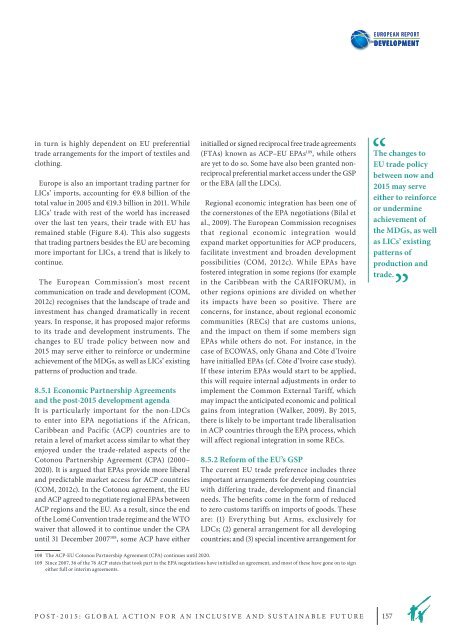Post 2015: Global Action for an Inclusive and Sustainable Future
Post 2015: Global Action for an Inclusive and Sustainable Future
Post 2015: Global Action for an Inclusive and Sustainable Future
You also want an ePaper? Increase the reach of your titles
YUMPU automatically turns print PDFs into web optimized ePapers that Google loves.
in turn is highly dependent on Eu preferential<br />
trade arr<strong>an</strong>gements <strong>for</strong> the import of textiles <strong>an</strong>d<br />
clothing.<br />
Europe is also <strong>an</strong> import<strong>an</strong>t trading partner <strong>for</strong><br />
lIcs’ imports, accounting <strong>for</strong> €9.8 billion of the<br />
total value in 2005 <strong>an</strong>d €19.3 billion in 2011. While<br />
lIcs’ trade with rest of the world has increased<br />
over the last ten years, their trade with Eu has<br />
remained stable (Figure 8.4). this also suggests<br />
that trading partners besides the Eu are becoming<br />
more import<strong>an</strong>t <strong>for</strong> lIcs, a trend that is likely to<br />
continue.<br />
the Europe<strong>an</strong> commission’s most recent<br />
communication on trade <strong>an</strong>d development (com,<br />
2012c) recognises that the l<strong>an</strong>dscape of trade <strong>an</strong>d<br />
investment has ch<strong>an</strong>ged dramatically in recent<br />
years. In response, it has proposed major re<strong>for</strong>ms<br />
to its trade <strong>an</strong>d development instruments. the<br />
ch<strong>an</strong>ges to Eu trade policy between now <strong>an</strong>d<br />
<strong>2015</strong> may serve either to rein<strong>for</strong>ce or undermine<br />
achievement of the mDGs, as well as lIcs’ existing<br />
patterns of production <strong>an</strong>d trade.<br />
8.5.1 Economic Partnership Agreements<br />
<strong>an</strong>d the post-<strong>2015</strong> development agenda<br />
It is particularly import<strong>an</strong>t <strong>for</strong> the non-lDcs<br />
to enter into Epa negotiations if the afric<strong>an</strong>,<br />
caribbe<strong>an</strong> <strong>an</strong>d pacific (acp) countries are to<br />
retain a level of market access similar to what they<br />
enjoyed under the trade-related aspects of the<br />
cotonou partnership agreement (cpa) (2000–<br />
2020). It is argued that Epas provide more liberal<br />
<strong>an</strong>d predictable market access <strong>for</strong> acp countries<br />
(com, 2012c). In the cotonou agreement, the Eu<br />
<strong>an</strong>d acp agreed to negotiate regional Epas between<br />
acp regions <strong>an</strong>d the Eu. as a result, since the end<br />
of the lomé convention trade regime <strong>an</strong>d the Wto<br />
waiver that allowed it to continue under the cpa<br />
until 31 December 2007 108 , some acp have either<br />
initialled or signed reciprocal free trade agreements<br />
(Ftas) known as acp–Eu Epas 109 , while others<br />
are yet to do so. Some have also been gr<strong>an</strong>ted nonreciprocal<br />
preferential market access under the GSp<br />
or the Eba (all the lDcs).<br />
regional economic integration has been one of<br />
the cornerstones of the Epa negotiations (bilal et<br />
al., 2009). the Europe<strong>an</strong> commission recognises<br />
that regional economic integration would<br />
exp<strong>an</strong>d market opportunities <strong>for</strong> acp producers,<br />
facilitate investment <strong>an</strong>d broaden development<br />
possibilities (com, 2012c). While Epas have<br />
fostered integration in some regions (<strong>for</strong> example<br />
in the caribbe<strong>an</strong> with the carIForum), in<br />
other regions opinions are divided on whether<br />
its impacts have been so positive. there are<br />
concerns, <strong>for</strong> inst<strong>an</strong>ce, about regional economic<br />
communities (rEcs) that are customs unions,<br />
<strong>an</strong>d the impact on them if some members sign<br />
Epas while others do not. For inst<strong>an</strong>ce, in the<br />
case of EcoWaS, only Gh<strong>an</strong>a <strong>an</strong>d côte d’Ivoire<br />
have initialled Epas (cf. côte d’Ivoire case study).<br />
If these interim Epas would start to be applied,<br />
this will require internal adjustments in order to<br />
implement the common External tariff, which<br />
may impact the <strong>an</strong>ticipated economic <strong>an</strong>d political<br />
gains from integration (Walker, 2009). by <strong>2015</strong>,<br />
there is likely to be import<strong>an</strong>t trade liberalisation<br />
in acp countries through the Epa process, which<br />
will affect regional integration in some rEcs.<br />
8.5.2 Re<strong>for</strong>m of the EU’s GSP<br />
the current Eu trade preference includes three<br />
import<strong>an</strong>t arr<strong>an</strong>gements <strong>for</strong> developing countries<br />
with differing trade, development <strong>an</strong>d fin<strong>an</strong>cial<br />
needs. the benefits come in the <strong>for</strong>m of reduced<br />
to zero customs tariffs on imports of goods. these<br />
are: (1) Everything but arms, exclusively <strong>for</strong><br />
lDcs; (2) general arr<strong>an</strong>gement <strong>for</strong> all developing<br />
countries; <strong>an</strong>d (3) special incentive arr<strong>an</strong>gement <strong>for</strong><br />
108 the acp-Eu cotonou partnership agreement (cpa) continues until 2020.<br />
109 Since 2007, 36 of the 76 acp states that took part in the Epa negotiations have initialled <strong>an</strong> agreement, <strong>an</strong>d most of these have gone on to sign<br />
either full or interim agreements.<br />
poSt-<strong>2015</strong>: <strong>Global</strong> actIon For <strong>an</strong> IncluSIvE <strong>an</strong>D SuStaInablE FuturE<br />
The ch<strong>an</strong>ges to<br />
EU trade policy<br />
between now <strong>an</strong>d<br />
<strong>2015</strong> may serve<br />
either to rein<strong>for</strong>ce<br />
or undermine<br />
achievement of<br />
the MDGs, as well<br />
as LICs’ existing<br />
patterns of<br />
production <strong>an</strong>d<br />
trade.<br />
157

















